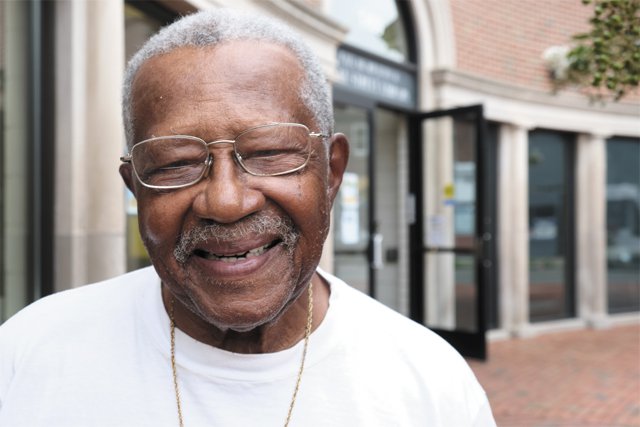The following is a companion piece to the feature on Richmond's Blackwell neighborhood in our September issue.

Photo by Jay Paul
Eddie ‘Dick’ Radden
A little boy runs around the alphabet carpet at Hull Street Library laughing as Eddie “Dick” Radden lifts up the sleeve of his Dunbar School shirt to locate the spot where Dr. James H. Blackwell Jr. vaccinated him. “It hurt,” he says. The 90-year-old was born just a few years before Blackwell’s death and recalls his mother working at another doctor’s office at 12th and Bainbridge six days a week for $5. He thumbs through minutes from Blackwell Civic Association meetings, stopping to highlight then-Vice Mayor Claudette McDaniel’s role in getting the library built in the 1990s. He and his friends also got together to rename Dunbar after prominent educator James H. Blackwell Sr. in 1952. “We didn’t care what we were called, we just kept moving forward,” says Radden, who established the school’s first PTA and served as its president for two years. When he went to the school one day and saw that the elder Blackwell’s picture was no longer hanging, he found an old history book with Blackwell’s portrait, cut it out, and, using his own money and a small stipend from the city, had it enlarged, framed and then mounted on the wall. “Everything that happened over here,” he says, “I was a part of it.”

Flossie Moore and Bishop Ernest Moore Jr. (Photo by Jay Paul)
Flossie Moore
“We never had to leave Hull Street for anything,” says Flossie Moore, smiling as the sunlight gently rests in her living room. She remembers the four grocery stores and other prominent businesses that animated Hull Street, the communal neighborhood of her girlhood where most people simply walked to get anything they needed. She considers Southside Plaza a major contributor to the decline of the Blackwell of her youth. Her father owned and operated J.L. Samuels & Son Contracting, which specialized in cement finishing. He employed many of the young men in the area in addition to football players and students at Virginia Union University. At one time, she says, her father owned almost the entire block where she was raised, in addition to properties on the North Side and in the West End of the city. She also fondly reminisces about the caring nature of her teachers at Blackwell’s schools. That deep pride in those schools keeps her and her former classmates involved in the neighborhood today.
Bishop Ernest Moore Jr.
“The name Blackwell is a high name of a man who broke boundaries for his people,” Bishop Ernest Moore says proudly in the home his grandfather built. “There’s still a fight in the soil of Blackwell.” Deeply protective of his mother and the elders of their community, Moore, who is a pastor at Destiny Community Church, explains that he is a process theologian, believing that God is always in the process of revealing himself. Living on the hill on Boston Avenue, he says he comes from what he considers black privilege: “By the time I came on the scene, we were already settled and established.” The infamously abandoned homes in the neighborhood, he says, popped up when elders started passing away. After integration, people were empowered and encouraged to attend school outside of Virginia, to move away. Moore doesn’t buy into the fear that elders won’t be able to afford their property taxes and rent because of gentrification in the neighborhood. “The Lord will make a way,” he says.
Anthony ‘A.J.’ Brewer
“Growing up,” says Anthony “A.J.” Brewer, the 33-year-old owner and operator of Brewer’s Cafe, “I always wanted to live in South Side.” His grandfather Dick Brewer was known as the “mayor” of Blackwell and anchored his family at the historic First Baptist Church of South Richmond. Brewer attended church there and remembers playing in front of his grandparents’ 14th Street home — until his grandparents divorced and left the neighborhood. Despite his family’s decision to leave Blackwell, he’s committed to raising his 3-year-old son, Parker, here. Rather than moving to an area with “better” schools, Brewer believes parents should keep their children in the neighborhood school and work to transform the education system by investing in and being involved with it. “I don’t believe in leaving to create better opportunities.”
